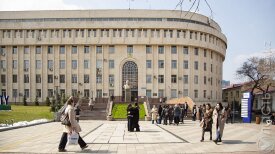Speaking at a government meeting, President Kassym-Jomart Tokayev repeated the overused refrain that Kazakhstan “needs to move towards a real market economy”. He argued that this is the only solution to fulfill the needs of the population. However, behind the rhetoric of welfare, lies a plan to support big business, which eventually worsens the well-being of regular citizens.
Faced with a lack of legitimacy after Qandy Qantar (Kazakh for “Bloody January”, the violent repression of urban protests across the country in 20222), the government promised changes that would please each group. To the citizens, it pledged higher wages and social security, to the businesses, it vowed less social responsibility and more deregulation.
Yet, the demands of the citizens are at odds with the interests of large entrepreneurs: Social reforms require the government to increase the minimum wage and the tax burden on businesses. Entrepreneurs, on their part, wish for the lowest minimum wage and tax rates.
When citizens demonstrate against the deterioration of their material conditions, the government is always quick in suppressing the protests by force. On the other hand, in the face of the demands of the entrepreneurial class, the government shows openness, for fear of capital outflow in case of resistance.
The state thus chooses the side of big business.
At the end of 2022, the government agreed to the request of a small circle of entrepreneurs to increase utility rates. The businessmen said this is a key step to ensure that the infrastructure is properly maintained.
After the 2023 parliamentary elections, other businessmen requested that the state raised the limit on fuel prices. The government agreed. Businessmen were not selling fuel to local gas stations because of the price gap with neighboring countries, causing shortages.
The government has not justified the continuing protection of businesses to the detriment of society. It has done so for years, helping entrepreneurs with subsidies and tax breaks in an effort to balance the market.
Some experts and journalists have lobbied the case of big business, arguing that price caps and social policies have created economic crises. The only way out, they say, is to scrap regulations and let the market rule.
But in fact deregulation is the root cause of these crises. Increasing utility and fuel prices contribute to an already galloping inflation. And timid wage raises cannot cover the growing gap, as entrepreneurs are unwilling to further increase salaries. So the population, unable to cut spending on basic needs, will become poorer, while the rich get richer.
As the masses demand greater social protection, big business will continue to push back. The harsher their clash, the thornier the question of legitimacy will be for the authorities, which continue to be on the side of the entrepreneurs.
Поддержите журналистику, которой доверяют.








